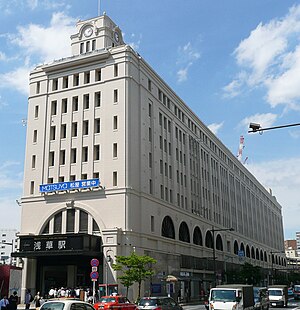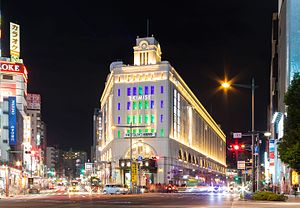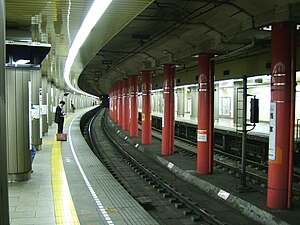Asakusa Station (Tokyo Metro, Toei, Tobu)
|
Asakusa Station
浅草駅 |
|
|---|---|

Tobu Asakusa Station, May 2012
|
|
| Location |
Taitō, Tokyo Japan |
| Operated by | |
| Line(s) | |
| Connections |
|
| History | |
| Opened | 1927 |
| Tobu Railway station | |

Tobu Asakusa Station at night
|
|
| Location | 1 Chome-4-1 Hanakawado, Taitō, Tokyo (東京都台東区花川戸一丁目4-1) Japan |
| Operated by |
|
| Line(s) |
|
| Platforms | 3 island platforms |
| Tracks | 4 |
| Connections | Bus terminal |
| Other information | |
| Station code | TS-01 |
| History | |
| Opened | 1931 |
| Traffic | |
| Passengers (FY2015) | 52,382 daily |
| Toei station | |

Toei Asakusa Station platform
|
|
| Location | 1 Chome-12-14 Komagata, Taitō, Tokyo (東京都台東区駒形一丁目12-14) Japan |
| Operated by | Toei Subway |
| Line(s) |
|
| Platforms | 2 side platforms |
| Tracks | 2 |
| Connections | Bus terminal |
| Other information | |
| Station code | A-18 |
| History | |
| Opened | 1960 |
| Traffic | |
| Passengers (FY2015) | 52,280 daily |
Asakusa Station (浅草駅 Asakusa-eki?) is a railway station in the Asakusa district of Taito, Tokyo, Japan, operated by Tobu Railway, Tokyo Metro, and Toei Subway. It formed one terminus of the original subway line in Tokyo, now the Ginza Line.
Asakusa Station is served by the following lines.
There is a connecting passage from the Tobu station to the Tokyo Metro Station, and a connecting passage from the Tokyo Metro portion to the Toei portion. However, there are no direct connecting passages from the Toei portion to the Tobu portion or from the Tsukuba Express station to the rest of the station complex. Passengers wishing to transfer between the Toei and the Tobu stations have to walk at street level, while passengers transferring between the Tsukuba Express station and the rest of the complex must also walk at street level, as the Tsukuba Express station is located 600 meters to the west of the station complex.
The Tobu Railway terminal is a surface station, which occupies a portion of the Matsuya Department Store. The station is used by local and limited express trains. Although Asakusa is the most "central" terminal of the Isesaki Line, it is connected to the next major terminal, Kita-Senju Station, by a length of track with sharp curves, beginning with the first stretch leaving the station, where trains have to turn 90 degrees to the right at a maximum speed of 15 km/h to cross the Sumida River. In part due to the station's somewhat awkward location, many express and semi-express services on the Skytree Line run through Kita-Senju to the Tokyo Metro Hanzomon Line and Tokyo Metro Hibiya Line rather than continue to Asakusa.
...
Wikipedia


